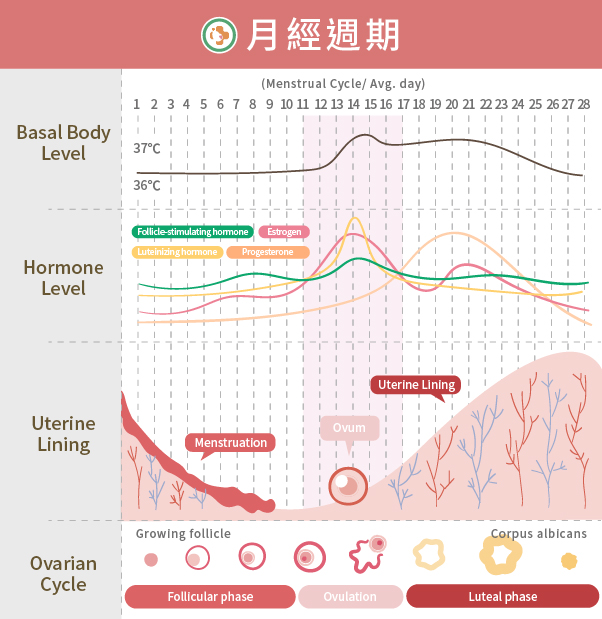Knowledge Sharing
4 Key Symptoms of Ovulation Bleeding: Analyzing Non-Menstrual Bleeding and Its Connection to Pregnancy
At Lee Women’s Hospital, we occasionally encounter anxious women who notice bleeding outside of their menstrual period and worry they might have a gynecological condition. However, not all non-menstrual bleeding is related to disease. If you notice light bleeding two weeks after your period, it may be ovulation bleeding.
Although ovulation bleeding is not always a sign of pregnancy, many women mistakenly believe it to be. How can you tell if non-menstrual bleeding is ovulation bleeding? Does the bleeding volume consistent with a period? Today, Lee Women’s Hospital shares the reasons for ovulation bleeding, possible symptoms, and whether ovulation bleeding affects pregnancy for those trying to conceive.
Ovulation Bleeding Q&A
What is Ovulation Bleeding?
Ovulation bleeding refers to light vaginal bleeding occurring around the ovulation period. For some women, it occurs during each menstrual cycle. Ovulation bleeding can happen before, during, or after ovulation.
Ovulation Bleeding: Short-term mild bleeding that lasts one to three days during the ovulation period
A woman's menstrual cycle includes four phases: follicular phase, ovulation phase, luteal phase, and menstrual phase. Ovulation occurs when an ovary releases an egg. If the egg is fertilized, it travels to the uterus to implant as an embryo. If not, the uterine lining sheds, leading to menstruation.
Women may suffer breast tenderness, ovulation pain, and increased vaginal discharge when the ovulation period begins. Ovulation bleeding typically involves a small amount of brown discharge or spotting, usually lasting only 2-3 days.
Is Ovulation Bleeding a Sign of Pregnancy?
Some women confuse ovulation bleeding with early pregnancy implantation bleeding. Ovulation bleeding happens mid-cycle and lasts about 1-2 days, while implantation bleeding can occur 10-14 days after fertilization.
Ovulation bleeding generally does not affect pregnancy chances, it might impact sexual activity during ovulation, which can then affect conception. It’s also essential to maintain hygiene during intercourse to avoid infections.
Learn More: Does implantation bleeding pose a miscarriage risk? Experts explain how to identify abnormal bleeding by color and amount.
Causes of Ovulation Bleeding
Ovulation bleeding is the result of the uterine lining gently shedding after ovulation due to low progesterone levels. This might cause light bleeding or brown discharge. Once progesterone levels stabilize, the bleeding stops, which is a normal physiological phenomenon.

Let's now learn about a crucial female hormone:
Progesterone: A hormone produced by the ovary's corpus luteum, maintaining uterine lining thickness. If pregnancy does not occur, the corpus luteum shrinks, progesterone levels drop, and the uterine lining sheds, causing menstruation.
Symptoms of Ovulation Bleeding
- Bleeding Color: Brownish streaks, occasionally accompanied by egg white-like discharge
- Bleeding Volume: Light bleeding, no need for pads
- Duration: Approximately 1-3 days
- Other Symptoms: Some women may experience bloating or mild lower abdominal discomfort
Other Ovulation Symptoms
- Increased vaginal discharge
- Ovulation pain (mild discomfort on one side of the lower abdomen)
- Breast tenderness
For more information on calculating your ovulation period, refer to: Ovulation: Online calculator, symptoms, ovulation bleeding
Is Ovulation Bleeding Like a Period? Do Non-Menstrual Bleeds Need Treatment?
Although ovulation bleeding is a common concern, it is a natural physiological phenomenon. No particular care is required as long as the bleeding is minimal and doesn't persist for longer than three days. However, if the bleeding is heavy like a period or accompanied by severe abdominal pain, medical attention is necessary.
When to See a Doctor for Non-Menstrual Bleeding?
Normal ovulation bleeding does not adversely affect health and usually does not require treatment. However, other types of non-menstrual bleeding may indicate gynecological conditions such as fibroids, polyps, endometrial cancer, or cervical erosion.
Consult a gynecologist if you experience:
- Increased bleeding
- Irregular menstrual cycles
- Postmenopausal bleeding
- Pain during intercourse
For more information on abnormal menstrual cycles, refer to: Menstrual Cycle: How to calculate the menstrual cycle?
Daily Care During Ovulation Bleeding
- Maintain cleanliness to prevent infections
- Adopt a healthy lifestyle and ensure adequate rest
- Maintain a balanced diet
- Keep a positive mood and manage stress appropriately
Usually, ovulation bleeding doesn't need special care. If the bleeding affects daily life, a gynecologist may prescribe hemostatic medication.
Does Ovulation Bleeding Affect Pregnancy? Is Sexual Activity Safe?
Ovulation bleeding normally has no effect on a woman's ability to become pregnant. However, bleeding could impact ovulation-related sexual activity, which could affect conception. In order to avoid infections, keep yourself clean during sexual activity. Seeking advice from a fertility professional could be worthwhile if you have been trying to get pregnant for a year without any luck.
How Long Does Ovulation Occur After Ovulation Bleeding? Is Pregnancy Likely During Ovulation Bleeding?
Many couples mistakenly believe that having intercourse only during the ovulation period maximizes pregnancy chances. However, prolonged abstinence can lead to sperm aging, reducing pregnancy likelihood. Regular intercourse (every 3-5 days) helps keep sperm in optimal condition for conception.
Moreover, having intercourse within two days before or after ovulation has the same pregnancy probability as during ovulation. Thus, regular sexual activity every 3-5 days can increase pregnancy chances more so than concentrating only on the dates of ovulation.
For reservation, please ocntact us through E-mail or submit the Q&A list.




